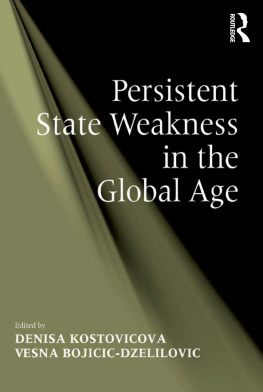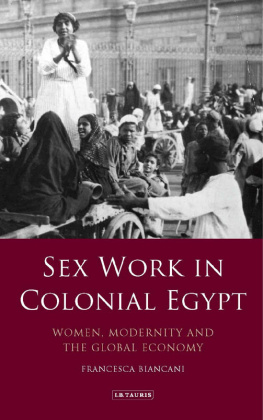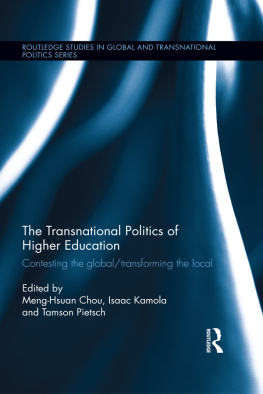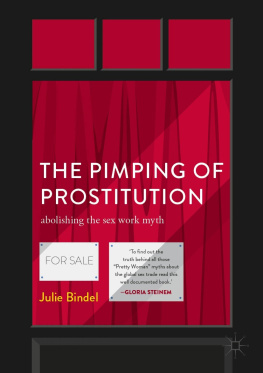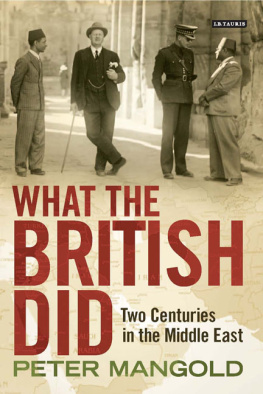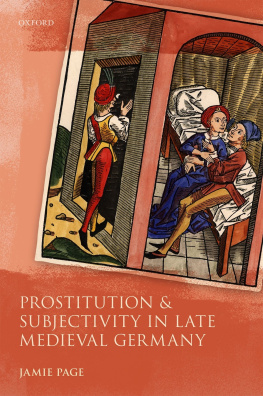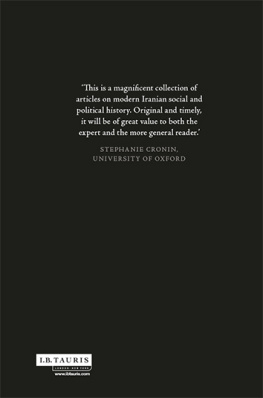Global Women,
Colonial Ports
Global Women,
Colonial Ports
P ROSTITUTION IN THE I NTERWAR M IDDLE E AST
L IAT K OZMA
Cover image: Group of prostitutes on corner of Kara-Oglan-sokak and Grand Rue Galata, The League of Nations Archives at Geneva, Box S179.
Published by State University of New York Press, Albany
2017 State University of New York
All rights reserved
Printed in the United States of America
No part of this book may be used or reproduced in any manner whatsoever without written permission. No part of this book may be stored in a retrieval system or transmitted in any form or by any means including electronic, electrostatic, magnetic tape, mechanical, photocopying, recording, or otherwise without the prior permission in writing of the publisher.
For information, contact State University of New York Press, Albany, NY
www.sunypress.edu
Production, Eileen Nizer
Marketing, Anne M. Valentine
Library of Congress Cataloging-in-Publication Data
Names: Kozma, Liat, author.
Title: Global women, colonial ports : prostitution in the interwar Middle East / Liat Kozma.
Description: Albany : State University of New York Press, [2016] | Includes bibliographical references and index.
Identifiers: LCCN 2016007291 (print) | LCCN 2016009109 (ebook) | ISBN 9781438462615 (hardcover : alk. paper) | ISBN 9781438462622 (e-book)
Subjects: LCSH: ProstitutionMiddle EastHistory.
Classification: LCC HQ231.9.A5 K69 2016 (print) | LCC HQ231.9.A5 (ebook) | DDC 306.740956dc23
LC record available at http://lccn.loc.gov/2016007291
10 9 8 7 6 5 4 3 2 1
C ONTENTS
I LLUSTRATIONS
A CKNOWLEDGMENTS
Research for this book was generously funded by the Israel Science Foundation, grant no. 304/11. The books publication was supported by the Hebrew University of Jerusalem. This book was also published with the support of the Israel Science Foundation.
Research for this book was conducted in multiple archives and libraries, and I am grateful to the archivists and librarians who assisted me in each. First and foremost, I thank the League of Nations archival staff, and especially Mr. Jacques Oberson, for hands-on advice in situ that introduced me to this topic and to the archives rich collection. I also thank the League of Nations Archives at Geneva for allowing me to use images from their collection and for kindly scanning them for me. The staff of the National Library of Israel helped me tremendously, particularly in accessing the UN publications collection. I thank the staff of the Wellcome Institute, and particularly Amanda Engineer at the Wellcome archives. The staff at the Bibliothque Interuniversitaire de Sant in Paris was most efficient in providing access to interwar medical press from French North Africa. The staff of Bibliothque Marguerite Durand was particularly helpful in tracing sources I would not have thought of. The Womens Library at the London School of Economics was an equally valuable resource. I thank the British National Archives, the Centre des Archives Diplomatiques de Nantes, the Centre des Archives Diplomatiques La Courneuve, and the Israel State Archives for enabling my access and work.
I thank my research assistants: Yael Segev, for following this project from its very beginning and adding her insights and suggestions; Maytal Mizrahi, for her excellent work in the Israel State Archives and the Zionist Archives in Jerusalem, on which my discussion of Haifa is based; and finally Sasha Schneidmann, for his work on the bibliography.
I have been fortunate to participate in teams of historians with whom I collaborated on various projects over the last four years. Those friends and colleagues shared their drafts with me and read my own, and I learned a great deal from each and every one of them. On Barak and Avner Wishnitzer, my co-editors at the Social History Workshop blog at Haaretz Web site, have been faithful and critical readers. Magaly Garcia Rodriguez and Davide Rodogno, my co-editors in a volume on the League of Nations social issues, were extremely helpful in helping me to situate my research in the larger League of Nations history, the history of traffic in women and the history of humanitarianism. Magalys critical reading, from the first draft of my book proposal, always pushed my research and argumentation further. I am most grateful for her continuous friendship and constant intellectual challenge. Camila Pastor contacted me at MESA in 2011 and asked if we could work on a joint panel togetherthree panels and a theme issue later, I am grateful to her for broadening my research horizons. Hanan Hammad and Francesca Biancani, superb social historians of prostitution and marginalized women in modern Egypt, joined us and were also wonderful readerstheir insights and their own drafts helped me to no end. Simon Jackson, Secil Ylmaz, and Daniel Lee joined us laterand their insights, friendship, and advice were most valuable.
Several friends and colleagues read parts of this manuscript and offered important advice. Alexandra Garbarini, Hanna-Louise Clark, Cyrus Schayegh, David Shasha, Naomi Levenkron, and Philippe Bourmaud were invaluable, and their suggestions enriched my work. Finally, Leigh Chipman and Ami Asher helped me to polish my English and produce the final version of this text, and Noga and Ori Kozma helped me review the bibliography.
Last but certainly not least, I thank my husband, Gady, for his continuous support and friendship.
I NTRODUCTION
The turn of the twentieth century witnessed massive waves of migration: from the old world to the new, from European countries to their colonies, as well as within and between African and Asian colonies. In this first era of modern globalization, commodities, ideas, information, and infections circulated the world on an unprecedented scale, with or without their human carriers. The telegraph, steamship, and railway made the world more interconnected than ever before.
Many of the migrants riding these waves were prostitutes. East European Jewish women worked in brothels in Bombay, Cape Town, Alexandria, and Buenos Aires; French women in Casablanca, Algiers, and Tunis; Syrian, Italian and Greek women in Port Said and Alexandria. In certain locales, the labor migration of working-class men created a numerical gender imbalance, and thus a demand for prostitution. Colonialism and global war mobilized men, mainly soldiers and sailors. Ease of travel created global tourism and communities of businessmen, merchants, and settlers. And like other immigrants and more legitimate workers, prostitutes circulated the global economy, often following their countrymen.
This mobility was accompanied by the globalization and internationalization of policies and controversies surrounding prostitutes. It was global in the sense that similar migration and regulation policies were adopted in multiple locations around the worldand policy makers as well as their critics were very much attuned to the experience of other national and colonial governments. It was international in the sense that such debates were brought before the first international body established to formulate international politics: the League of Nations. These collaborative efforts embodied a belief that only cooperation between different nations would be able to contain the damages of global connectivity.


